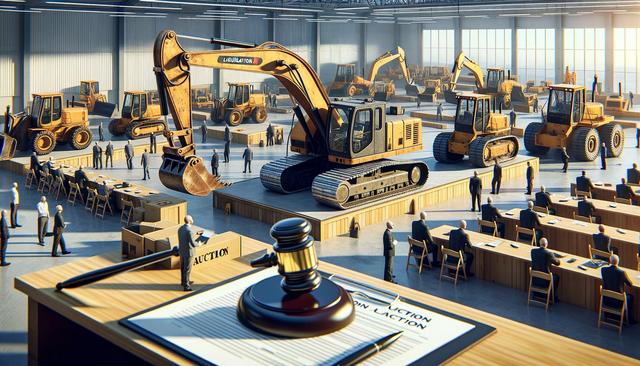Understanding Liquidation Auctions and Their Benefits
Liquidation auctions are sales events where businesses, often due to closure, bankruptcy, or restructuring, sell off their assets, including industrial machinery. For small business owners, these auctions offer a chance to purchase heavy equipment at significantly reduced prices compared to new or retail alternatives. This can be especially helpful when operating on a tight budget or looking to expand capabilities without heavy capital investment.
There are several benefits to buying from liquidation auctions:
- Cost savings: Equipment is often sold below market value.
- Variety of options: Auctions can include everything from forklifts and loaders to CNC machines and compressors.
- Quick acquisition: Auctions often have fixed dates and quick delivery terms.
- Opportunity to scale: Smaller businesses can grow by acquiring machines they couldn’t otherwise afford.
However, understanding how these auctions work is key to making smart purchasing decisions. Depending on the auction, items may be sold in-person, online, or through a hybrid format. It’s essential to research the auctioneer, the terms of sale, and the condition of the equipment before placing a bid.
Where to Find Reliable Liquidation Auctions
Finding legitimate and worthwhile liquidation auctions requires a bit of homework. Many auction houses specialize in industrial equipment and list upcoming sales on their websites. Online marketplaces have also become popular platforms for hosting auctions, allowing buyers to participate from anywhere with internet access.
Here are some reliable ways to discover auctions:
- Industry newsletters or trade publications
- Online auction platforms focused on industrial equipment
- Local business liquidation notices
- Referrals from industry contacts or equipment suppliers
Before participating, always verify the auction’s credibility. Look for reviews or testimonials, check how long the auctioneer has been in business, and confirm that the equipment matches its descriptions. Transparency in listings, including detailed photographs and inspection reports, is a good indicator of a trustworthy auction.
Preparing for the Auction – Research and Inspection
Preparation is critical before entering a liquidation auction. Start by identifying the specific machinery you need and set a realistic budget. Research the typical market value of the equipment to understand what a fair auction price would be. This will help prevent overbidding in the heat of the moment.
Most auctions offer a preview period where potential buyers can inspect the items. Use this opportunity to:
- Check the physical condition of the machinery
- Ask for maintenance records or service history, if available
- Verify operating hours or usage indicators
- Assess compatibility with your current operations
If you’re not mechanically inclined, consider bringing a technician or equipment expert to help evaluate the machinery. This can save you from unexpected repair costs or unusable purchases down the line.
Bidding Strategy and Buying Tips
When it comes to bidding, discipline and strategy are key. Start by setting a maximum bid for each item, based on your valuation and budget. Avoid getting caught up in bidding wars that can drive prices above fair value. Many experienced buyers recommend observing a few auctions before participating to get a feel for how they operate.
Effective bidding strategies include:
- Starting low and bidding incrementally
- Waiting until the final moments to place your bid (if allowed)
- Using proxy bidding tools on online platforms
- Sticking strictly to your budget limit
Also, factor in additional costs such as taxes, buyer’s premiums, transportation, and potential repairs. These expenses can impact the total value of the deal and should be included in your purchasing decision.
After the Auction – Transport, Setup, and Maintenance
Once you’ve successfully purchased machinery, the next steps involve logistics and integration into your operations. First, arrange for transportation. Some auctions may offer delivery services, but often, buyers are responsible for pickup. Make sure equipment is properly secured during transit to avoid damage.
Upon arrival, inspect the machinery again before installation. Depending on the complexity of the equipment, you may need skilled technicians to set it up and ensure it’s operational. It’s also a good idea to:
- Schedule preventative maintenance before use
- Train your team on safe and efficient operation
- Document ownership and register warranties if applicable
- Keep records of purchase for accounting and tax purposes
Successfully integrating the machinery into your workflow can enhance productivity and operational capacity. Building a maintenance schedule will also help extend the life of your purchase and maximize its return on investment.
Conclusion: Smart Purchasing Can Fuel Small Business Growth
Buying industrial machinery at liquidation auctions is a strategic move for small business owners seeking to enhance capabilities while managing costs. With the right preparation, research, and post-purchase planning, these auctions can serve as a valuable resource for acquiring high-quality equipment. By understanding the process and approaching each auction with clear goals and knowledge, small businesses can make informed decisions that lead to long-term operational benefits and growth opportunities.




Leave a Reply